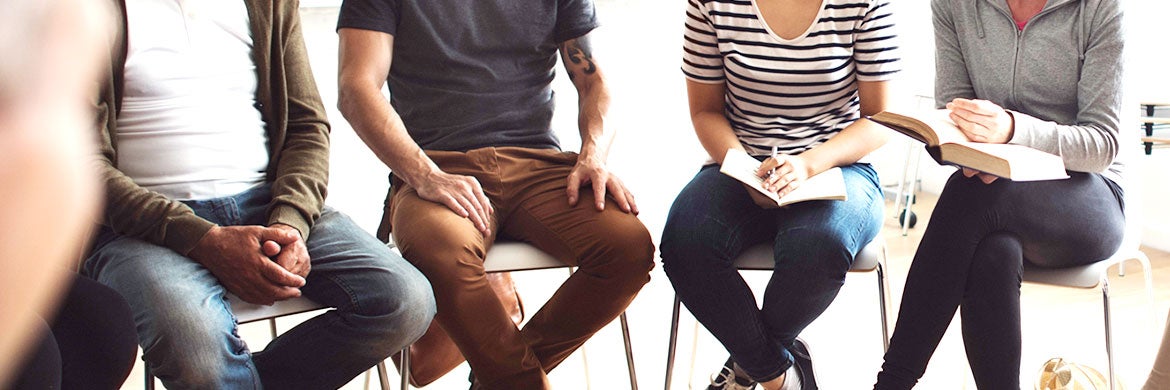CAPS is Open!
To speak to a 24/7 crisis counselor: Call 951-UCR-TALK or 951-827-5531 and select option 1
To speak to our front desk: Call 951-827-5531 and select option 2
Share Your Concerns Safely and Confidently
Winter 2026 Group Therapy Options: PDF Flyer
Group Introduction
Therapy groups allow students to work with others who share similar concerns. Members talk about what is troubling them and give feedback and support in a safe, supportive environment. Interactions offer group members an opportunity to learn more about the way they interact with others and to try out new ways of relating to one another.
The first few sessions focus on the establishment of trust, allowing members to talk personally and honestly. Having each individual make a personal commitment to the group and its goals significantly fosters group trust and cohesion.
Therapy groups usually have between 4 and 8 members and two clinicians. Groups meet weekly for 60 or 90 minutes and there is no session limit.
What's the Difference Between Therapy and Skills Groups?
Counseling and Psychological Services offers therapy groups and skills groups.
Skills groups are typically one hour long and involve anywhere from 3-10 session commitment. Skills groups are more structured than therapy groups and have more of a workshop format than a counseling format. In skills groups, one or more clinicians provide psychoeducational information and provide opportunities for members to apply the concepts they are learning to their real, everyday lives.
Therapy groups are less structured and tend to focus on the interactions of group members to process, relate to, and explore emotional and life experiences.
Pre-Screening
For some groups, a pre-screening session may be required. A pre-screening session is a brief meeting with leader(s) before groups begin. The pre-screening provides information about the group and helps determine if group therapy is the best treatment option or adjunct treatment option (for students already engaged in individual therapy).
Ground Rules
Group sessions are confidential. Group members are asked not to disclose the content of sessions or to reveal the identity of members to others outside of group.
It is expected that you will attend group every week. If there is an urgent matter that prevents you from attending, please notify the group leader(s) via phone call at CAPS or via secure message (UCR Student Health portal). You can leave a message with CAPS front desk staff. There is no limit to the number of group sessions you can attend. Arriving to group on time is very important. If, after a number of group sessions, you find that the group is not a good fit for you, please let the group leader(s) know.
Therapy Groups
Group Therapy offerings are based on the needs and interests of students and current groups are listed below. If you are a current CAPS client, please talk with your counselor about being referred for a group. If you are not a client, please schedule an intake appointment prior to signing up by calling or visiting Counseling and Psychological Services. After you have been referred to group, you will typically be scheduled for a brief screening appointment with the person who is leading or co-leading the group.
CAPS Clinical Groups for Winter 2026:
-
Anxiety Management Group
Do you feel like you are constantly worried? Do you feel tense and on-edge? Do you tend to over-think social situations and have difficulties staying in the moment? If so… consider joining the CAPS Anxiety Management Group! During this 6-week group, CAPS therapists will discuss the tools and techniques that will help you lower your anxiety.
Topics and skills include: Understanding the Anxiety/Avoidance feedback loop, learning to restructure and get distance from anxious/unhelpful thoughts, practicing relaxation techniques to decrease stress, and the benefits of mindfulness.
This group will meet in person on Tuesdays from 3pm - 4:30pm during Weeks 3-8. -
Creative Coping Skills
The Creative Coping Skills Group is an in-person group that offers a safe space to learn hands-on coping skills and authentically express identity, hopes, dreams, experiences, and truth. This is an invitation to enjoy the process. Breathe, observe, and play. There is no right or wrong way to participate. No art skills are required!
2026 Winter Quarter Group Session Scheduled Topics:
- Take a Break, Self Regulate
- Disarming Your Inner Critic
- Daring Greatly
- Intersectionality Masks
- Inspirational Scrolls
- Traveling Drum
This group will meet on Thursdays from 1:30pm - 3pm during Weeks 3-8.
Past Groups
As mentioned above, the groups we offer each quarter are dependent on student needs and interest. Here are some of the groups that we have offered in the past.
-
Cafecito y Comunidad
Cafecito y Comunidad is a space for all students who identify with the Latino/a/e, Chicano/a/e, or Hispanic community. Join CAPS counselors as we build community and share experiences with mental health, well-being, and academic/professional success on campus and within our communities. Discussion topics will be determined by group members and may include family, culture, diversity, relationships, identity, and belonging. Spanish/Spanglish is welcomed, and cafecito/snacks are provided.
-
General Therapy/Process Group Coed
A general therapy group.
-
Graduate Student Therapy Group - Coed
A general therapy group for graduate students.
-
Introduction to Mindfulness
This skills group will help you to understand the basic principles of mindfulness, increase your well-being through increased self-awareness, and practice a variety of mindfulness exercises that will help with difficult emotions.
-
Overcoming Social Anxiety
This skills group will help you to process and reduce social anxiety.
-
Project Life Force-College
This is a group therapy intervention for students experiencing suicidal thoughts that combines safety planning, emotion regulation skills, and social support. Participants create and/or revise safety plans throughout the course of treatment while learning distress tolerance, emotion regulation, and friendship building/interpersonal skills to integrate into their safety plans.
-
Reclaim: An Empowerment Circle
Discover a supportive haven with "Reclaim: An Empowerment Circle," a trauma-informed therapy group dedicated to fostering safety, community, and resilience for trauma survivors. This group experience is designed to help female-identifying folks navigate their journey of healing by identifying areas of safety while developing somatic skills to respond to triggers and cultivate a sense of empowerment. In a nurturing environment, come and connect with others who understand the challenges of restoration, learn practical techniques to ground in moments of distress, and build lasting strategies for emotional wellbeing. Join us to find solace in shared experiences, gain confidence through somatic practices, and begin to step forward with renewed strength and hope. All trauma survivors are welcome regardless of their location along their path of reclamation.
-
RelationShift
This is a semi-structured in-person group that will provide a safe and supportive space to explore and learn skills about common relationship concerns such as boundaries, conflict resolution, and attachment. The goal of the group is to leave group members feeling more aware of how they relate to others and more confident in navigating relational issues.
-
Sexual Orientation and Gender Identity & Expression (SOGIE)
The SOGIE in-person therapy/support group is for queer and TGD UCR students experiencing symptoms of depression, anxiety, trauma and other relevant mental health concerns as well as for individuals in need of a welcoming space for discussing matters of sexual and/or gender identity. The LGBTIQ communities are underserved within the Riverside County area, and we are looking forward to offering a safe place for our students.

